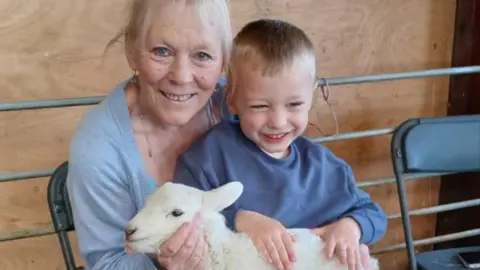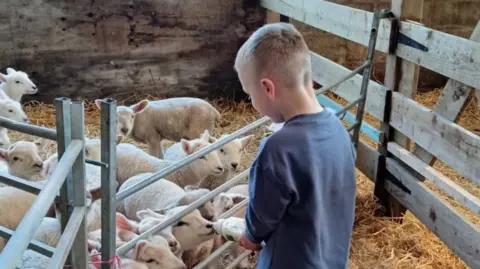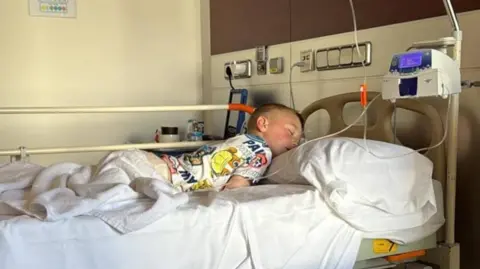Boy, 4, left in hospital as 74 ill from petting farm
The parents of a four-year-old boy who became very unwell after a trip to a petting farm have described the "nightmare" of his symptoms developing while on holiday abroad.
Public health officials are examining 74 cases of cryptosporidium linked to visits to Cowbridge Farm Shop at Marlborough Grange Farm in Cowbridge, Vale of Glamorgan, during April.
Cryptosporidium is a parasite, often linked to contact with young farm animals, that can infect your bowels and cause an unpleasant and sometimes dangerous illness.
Public Health Wales (PHW) said 16 of those affected had been in hospital for at least one night.
The farm shop, which the BBC has approached for comment, has voluntarily suspended its feeding and petting sessions and is cooperating fully with the ongoing investigation, PHW said.
 Family photo
Family photoGareth Carpenter and Kate Wiejak, from Bridgend, said their son Michael visited the farm on 11 April with his grandmother, Margaret Carpenter, while they packed for a family holiday.
Kate, 39, said: "We go every single year, we love lamb petting, it's an amazing attraction for kids."
Kate said Margaret "made sure" Michael washed his hands afterwards, and also used hand sanitiser.
 Family photo
Family photoThe following day, the family - including Kate's 16-year-old daughter and both of Michael's grandmothers - flew to Spain, renting a villa in Malaga with another family.
"We were looking forward to a nice holiday," said Gareth, adding they "wouldn't dream" of getting on the flight if there had been any sign of illness beforehand.
But by 14 April, Michael had begun to feel unwell, with a raised temperature and diarrhoea.
"We put it down to the food, or that he'd had too much sun as we'd been out by the pool for a couple of hours," said Gareth, 46.
"We thought, give him some sleep and a bit of Calpol and by the morning he'd be right as rain."
But Michael continued to be very unwell throughout the night and so, the following morning, they called the emergency medical services who advised them to take Michael to hospital.
"As a parent it was difficult seeing your child go through that," he told BBC Radio Wales Breakfast on Monday.
 Family photo
Family photoThe parents said "luckily" there was a private hospital just a five minutes' drive away.
The couple paid an €850 (£719) deposit to get Michael seen - €5,000 (£4,229) in total, later claimed back through their insurance - but said staff were "absolutely amazing" despite significant language barriers.
"We literally saw a doctor within 10 minutes, I was shocked," said Kate.
Doctors said Michael had a serious infection and he spent three days in hospital.
"It was an absolute nightmare," said Kate.
 Family photo
Family photoOn their return to Wales that weekend, which was a bank holiday, Michael still had a "bad belly" and so they took him to see a GP on 22 April, who requested a stool sample.
"We were driving ourselves crazy," said Gareth.
"We were thinking, was it a bit of chicken he ate, or an ice cream his Nana gave him - she was feeling terrible about that - or was it something in the water?"
Gareth said he received a call from Public Health Wales the following day to say the test result had shown Michael was infected with cryptosporidium, and they asked him if Michael had been around any animals.
When Gareth shared the details of the farm visit, he said he was told that there were a number of other cases of the infection linked to the same venue.
Both Kate and Gareth later became unwell with similar, but much milder, symptoms and Gareth said he was still experiencing stomach cramps, more than four weeks after Michael's contact with the animals.
But they said Michael had now made a full recovery, and no one else in their holiday party had contracted it.
Kate said Margaret "blames herself" for taking Michael to the farm, but said she wished "more information" had been given to people attending the petting sessions about the potential risks.
"It's only when something happens that you realise how serious it is," said Gareth.
"I would hate to see another parent go through the same thing."
Michael's parents had to take him back to hospital on Sunday with stomach cramps and he had another bout of severe vomiting back at home.
"I can't be sure if it's linked but my parental senses are tingling… the stomach pain, the vomiting is exactly what he had before," Gareth said.
What is cryptosporidium?
- Cryptosporidium is a microscopic parasite that can cause an unpleasant and sometimes dangerous illness called cryptosporidiosis.
- It lives in the intestines of infected humans and animals and is passed out in their poo.
- It can then spread to water sources like lakes, rivers, and swimming pools, as well as food like raw milk.
- The illness can affect anyone but is most common in children aged one to five.
- Symptoms, which can last for around two weeks, include severe watery diarrhoea, vomiting, stomach cramps, nausea, fever, and loss of appetite.
- There is no specific treatment but most people feel better within a month.
Source: UK Health Security Agency
Su Mably, consultant in health protection for Public Health Wales, said: "We are continuing to work with our partners to investigate this outbreak.
"Although cryptosporidium infection is usually mild and clears up on its own, it can cause more serious illness in young children and people with weakened immune systems.
"If you visited the farm and feel unwell, please contact your GP or call NHS 111.
"It is possible for this infection to be passed on from one person to another, for example if someone is caring for a family member who is unwell.
"It is important to protect yourself by washing your hands well, particularly before preparing food."
